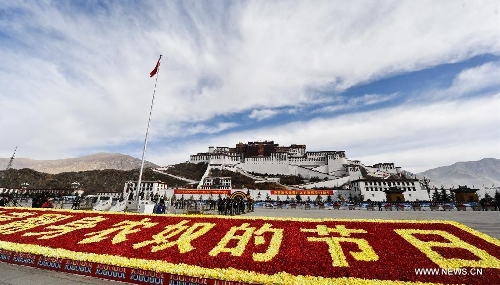Tibetans celebrate Serfs' Emancipation Day

Residents of southwest China's Tibet Autonomous Region celebrated the 54th anniversary of Serfs' Emancipation Day on Thursday.
About 3,000 people gathered in Potala Square in the regional capital of Lhasa Thursday morning, singing the national anthem to commemorate the event.
Authorities designated March 28 as the day to commemorate Tibetan democratic reform that ended the feudal serf system in 1959. The reform freed one million Tibetan serfs, or 90 percent of the region's population at that time.
Nyima Tsering, a 71-year-old retiree, said he has joined in the public celebration every year.
"It is a festival for all Tibetan people," he said.
Born into a family of serfs, Nyima said he led a hard life and that being a serf deprived him of his freedom.
The emancipation allowed him to regain his freedom, get educated and lead a decent life, he said.
On Sunday, performers staged a special show to commemorate the anniversary at Qusum Middle School in Qusum County.
The performances incorporated dancing, poetic readings and dramas depicting the serfs' appreciation for the Communist Party of China (CPC).
Ke Donghai, secretary of the Qusum County Committee of the CPC, said the show was intended to teach the younger generation about the history of Tibet and encourage them to make contributions to the country.
Tashi Dorje, himself a former serf, said he has witnessed the CPC's endeavors to boost Tibet's economy, develop local education and healthcare and preserve the region's traditional culture.
Government statistics show that Lhasa's GDP reached 26.26 billion yuan (4.22 billion US dollars) last year, a year-on-year increase of 18.2 percent.
The government plans to invest 193.1 billion yuan in 226 projects in Tibet from 2011 to 2015, about 2.5 times the amount invested during the 2006-2010 period.
"What we have achieved so far did not come easy and we should learn to cherish it," said Dawa, deputy secretary of the Lhasa Municipal Committee of the CPC, adding that people should make joint efforts to build a more beautiful and prosperous Lhasa.